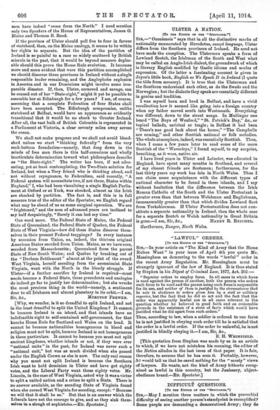" LAWFUL " ORDERS.
[To sus Emma op as “BrsorAsou..]
Six,—In your article on "The Kind of Army that the Home Rulers Want" in your issue of April 4th you quote Mr. Massingliam as demurring to the words "lawful" order in the recent Army Regulation. Mr. Massingham must be strangely ignorant of the law of England. It is thus stated by Stephen in his Digest of Criminal Law, 1877, Art. 202 :— "Superior orders to employ force In all oases in which force is used against the person of another, both the person who orders such force to be used and the person using such force is responsible for its use, and neither of them is justified by the circumstance that he acts in obedience to orders given him by a civil or military superior, but the fact that he did so sot and the fact that the order was apparently lawful are in all cases relevant to the question whether he believed in good faith and on reahonable grounds in the "existence of a state of facts which would have justified what he did apart from such orders."
Thus, according to law, when a soldier is ordered to use force he is not justified in obeying such order till he is satisfied that the order is a lawful order. If the order be unlawful, he is not justified in blindly obeying it.—I am, Sir, &e.,
E. H. WHINFIELD.
[This quotation from Stephen was made by us in an article to which, if we have not mistaken his meaning, the editor of the Nation alludes in the last issue of that paper. It is fair, therefore, to assume that he has seen it. Probably, however, h.:: would tell us that he cared nothing for the "musty" views of lawyers. He wants, not the kind of Army hitherto recog. nixed as lawful in this country, but the Janissary, abject. obedience brand.—ED. Spectator.]






































 Previous page
Previous page